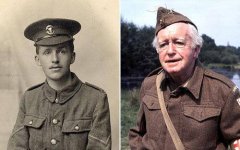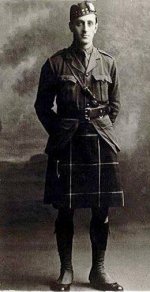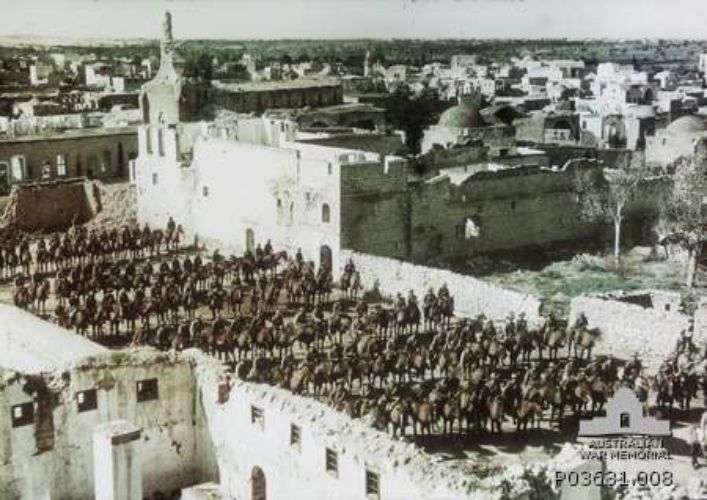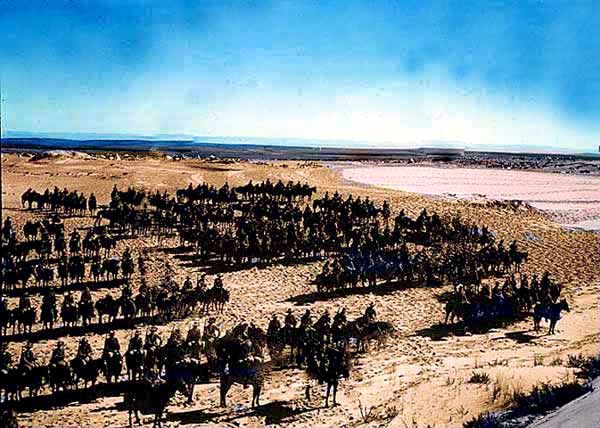You are using an out of date browser. It may not display this or other websites correctly.
You should upgrade or use an alternative browser.
You should upgrade or use an alternative browser.
WW1 Pic Of the Day (1 Viewer)
- Thread starter Rob
- Start date
waynepoo
Colonel
- Joined
- Jan 3, 2012
- Messages
- 9,801
Victoria Cross Laureate of the first A.I.F.
Lt. Albert Chalmers Borella VC, MM. 26th Battalion.
On 17-18 July 1918 Lt. Albert Borella led a platoon in an attack to straighten the front line beyond
Villers-Bretonneux, from which a major British offensive was to be launched a few weeks later. While
ahead of his troops, he single-handedly captured a machine-gun. Then, after clearing a trench and
dug-outs, he inspired his men to hold out during two heavy enemy-counter attacks. Lt. Borella
had earlier received the Military Medal and been mentioned in Despatches.
At 36 years of age Lt. Albert Borella was the oldest of the first A.I.F to receive the Victoria Cross.
Wayne.
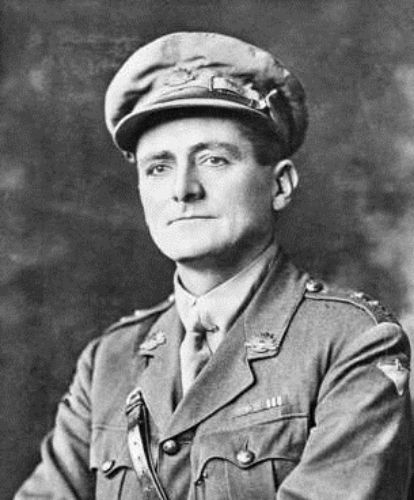
Lt. Albert Chalmers Borella VC, MM. 26th Battalion.
On 17-18 July 1918 Lt. Albert Borella led a platoon in an attack to straighten the front line beyond
Villers-Bretonneux, from which a major British offensive was to be launched a few weeks later. While
ahead of his troops, he single-handedly captured a machine-gun. Then, after clearing a trench and
dug-outs, he inspired his men to hold out during two heavy enemy-counter attacks. Lt. Borella
had earlier received the Military Medal and been mentioned in Despatches.
At 36 years of age Lt. Albert Borella was the oldest of the first A.I.F to receive the Victoria Cross.
Wayne.

Rob
Four Star General
- Joined
- May 18, 2005
- Messages
- 26,622
200 posts!
Loving this thread! Keep it up chaps, the weeks are ticking by until the 100th Centenary of the Great War. This is one of the most enjoyable threads on the forum imo:salute::
Rob
Rob
Four Star General
- Joined
- May 18, 2005
- Messages
- 26,622
Albert Ball VC, DSO & Two Bars, MC (14 August 1896 – 7 May 1917)
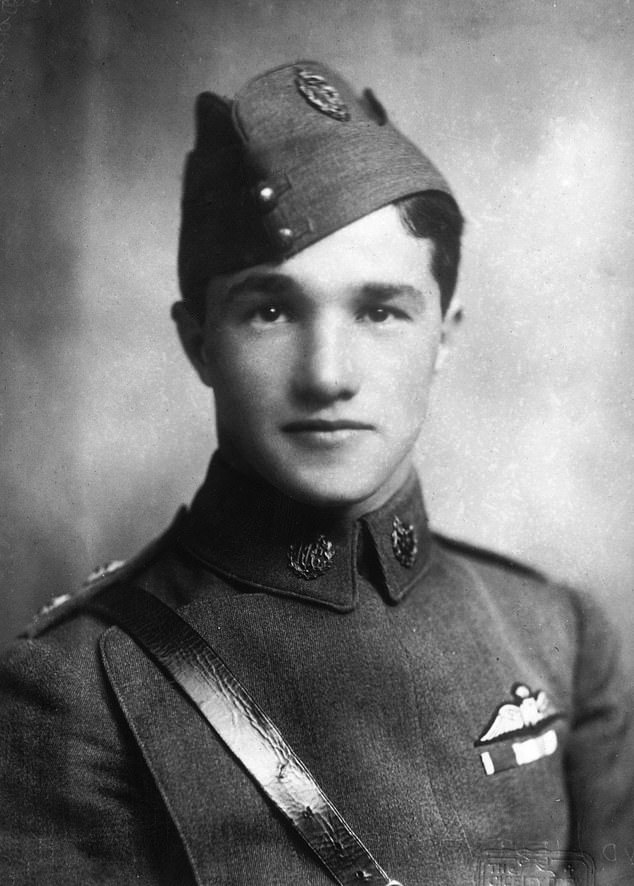
Lt. (temp. Capt.) Albert Ball, D.S.O., M.C., late Notts. and Derby. R., and R.F.C.
For most conspicuous and consistent bravery from the 25th of April to the 6th of May, 1917, during which period Capt. Ball took part in twenty-six combats in the air and destroyed eleven hostile aeroplanes, drove down two out of control, and forced several others to land.
In these combats Capt. Ball, flying alone, on one occasion fought six hostile machines, twice he fought five and once four. When leading two other British aeroplanes he attacked an enemy formation of eight. On each of these occasions he brought down at least one enemy.
Several times his aeroplane was badly damaged, once so seriously that but for the most delicate handling his machine would have collapsed, as nearly all the control wires had been shot away. On returning with a damaged machine he had always to be restrained from immediately going out on another.
In all, Capt. Ball has destroyed forty-three German aeroplanes and one balloon, and has always displayed most exceptional courage, determination and skill.[110]

Copyright of; TenthEaglesteve bowen
Lt. (temp. Capt.) Albert Ball, D.S.O., M.C., late Notts. and Derby. R., and R.F.C.
For most conspicuous and consistent bravery from the 25th of April to the 6th of May, 1917, during which period Capt. Ball took part in twenty-six combats in the air and destroyed eleven hostile aeroplanes, drove down two out of control, and forced several others to land.
In these combats Capt. Ball, flying alone, on one occasion fought six hostile machines, twice he fought five and once four. When leading two other British aeroplanes he attacked an enemy formation of eight. On each of these occasions he brought down at least one enemy.
Several times his aeroplane was badly damaged, once so seriously that but for the most delicate handling his machine would have collapsed, as nearly all the control wires had been shot away. On returning with a damaged machine he had always to be restrained from immediately going out on another.
In all, Capt. Ball has destroyed forty-three German aeroplanes and one balloon, and has always displayed most exceptional courage, determination and skill.[110]

Copyright of; TenthEaglesteve bowen
waynepoo
Colonel
- Joined
- Jan 3, 2012
- Messages
- 9,801
Victoria Cross laureate of the first A.I.F.
Corp. Walter Ernest Brown VC, DCM. 20th Battalion.
For most conspicuous bravery and determination on 6 July 1918 when with
an advanced party from his battalion which was going into the line in relief.
The company to which he was attached carried out during the night a minor
operation resulting in the capture of a small system of enemy trench. Early
on the following morning an enemy strong point about seventy yards distant
caused the occupants of the newly captured trench great inconvenience by
persistent sniping. Hearing that it had been decided to rush this post,
Corporal Brown, on his own initiative, crept out along the shallow trench
and made a dash towards the post. An enemy machine-gun opened fire
from another trench and forced him to take cover. Later he again dashed
forward and reached his objective. With a Mills grenade in his hand he
stood at the door of a dug-out and called on the enemy occupants to surrender.
One of the enemy rushed out, a scuffle ensued, and Corporal Brown knocked him
down with his fist. Loud cries of ''Kamerad'' were then heard, and from the dug-out
an officer and eleven other ranks appeared. This party Corporal Brown brought back
as prisoners to his line, the enemy meanwhile from other positions bringing heavy
machine-gun fire to bear on the party.
Wayne.
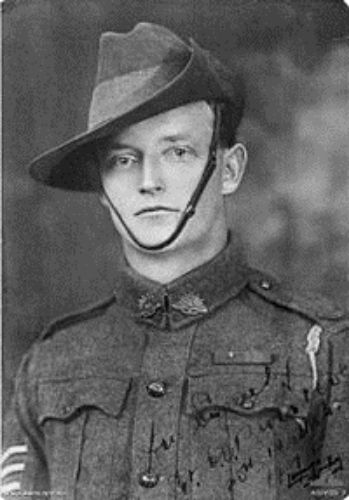
Corp. Walter Ernest Brown VC, DCM. 20th Battalion.
For most conspicuous bravery and determination on 6 July 1918 when with
an advanced party from his battalion which was going into the line in relief.
The company to which he was attached carried out during the night a minor
operation resulting in the capture of a small system of enemy trench. Early
on the following morning an enemy strong point about seventy yards distant
caused the occupants of the newly captured trench great inconvenience by
persistent sniping. Hearing that it had been decided to rush this post,
Corporal Brown, on his own initiative, crept out along the shallow trench
and made a dash towards the post. An enemy machine-gun opened fire
from another trench and forced him to take cover. Later he again dashed
forward and reached his objective. With a Mills grenade in his hand he
stood at the door of a dug-out and called on the enemy occupants to surrender.
One of the enemy rushed out, a scuffle ensued, and Corporal Brown knocked him
down with his fist. Loud cries of ''Kamerad'' were then heard, and from the dug-out
an officer and eleven other ranks appeared. This party Corporal Brown brought back
as prisoners to his line, the enemy meanwhile from other positions bringing heavy
machine-gun fire to bear on the party.
Wayne.

waynepoo
Colonel
- Joined
- Jan 3, 2012
- Messages
- 9,801
Albert Ball VC, DSO & Two Bars, MC (14 August 1896 – 7 May 1917)

Lt. (temp. Capt.) Albert Ball, D.S.O., M.C., late Notts. and Derby. R., and R.F.C.
For most conspicuous and consistent bravery from the 25th of April to the 6th of May, 1917, during which period Capt. Ball took part in twenty-six combats in the air and destroyed eleven hostile aeroplanes, drove down two out of control, and forced several others to land.
In these combats Capt. Ball, flying alone, on one occasion fought six hostile machines, twice he fought five and once four. When leading two other British aeroplanes he attacked an enemy formation of eight. On each of these occasions he brought down at least one enemy.
Several times his aeroplane was badly damaged, once so seriously that but for the most delicate handling his machine would have collapsed, as nearly all the control wires had been shot away. On returning with a damaged machine he had always to be restrained from immediately going out on another.
In all, Capt. Ball has destroyed forty-three German aeroplanes and one balloon, and has always displayed most exceptional courage, determination and skill.[110]

Copyright of; TenthEaglesteve bowen
A great pilot, I have the JJD figure and aircraft of this legend.....:salute::
Wayne.
Martin Tabony
Command Sergeant Major
- Joined
- Nov 6, 2009
- Messages
- 2,077
In 1914, the 20-year-old Arnold Ridley, who played Private Godfrey in "Dad's Army", enlisted in the Somerset Light Infantry as a private and saw considerable action on the Western Front. Taking part in the Battle of the Somme in 1916, Ridley was wounded in the left arm and both legs by shrapnel and during a hand-to-hand action, a German soldier struck him on the head with a rifle butt. For the rest of his life, he only had partial use of his left arm, he walked with a limp and his head injuries left him prone to blackouts. Despite this, he managed to re-enlist at the beginning of the Second World War and joined the BEF in France in 1940 but his old injuries proved too difficult for him and he was invalided back home.
Attachments
Martin Tabony
Command Sergeant Major
- Joined
- Nov 6, 2009
- Messages
- 2,077
The actor Basil Rathbone also served with distinction in the Great War. He joined the London Scottish in 1915 and was later commissioned into the 2nd Battalion, The Liverpool Scottish. He was his battalion's intelligence officer and reached the rank of Captain. He was awarded the Military Cross in September 1918.
His younger brother John was killed on 4 June 1918 whilst serving as a Captain in the 3rd Battalion, The Dorset Regiment.
His younger brother John was killed on 4 June 1918 whilst serving as a Captain in the 3rd Battalion, The Dorset Regiment.
Attachments
Rob
Four Star General
- Joined
- May 18, 2005
- Messages
- 26,622
In 1914, the 20-year-old Arnold Ridley, who played Private Godfrey in "Dad's Army", enlisted in the Somerset Light Infantry as a private and saw considerable action on the Western Front. Taking part in the Battle of the Somme in 1916, Ridley was wounded in the left arm and both legs by shrapnel and during a hand-to-hand action, a German soldier struck him on the head with a rifle butt. For the rest of his life, he only had partial use of his left arm, he walked with a limp and his head injuries left him prone to blackouts. Despite this, he managed to re-enlist at the beginning of the Second World War and joined the BEF in France in 1940 but his old injuries proved too difficult for him and he was invalided back home.
Excellent post Martin. He was in every way a real War hero, how ironic that he became a nations favourite in Dads Army playing a mild mannered, incontinent, conscientious objector .
Rob
waynepoo
Colonel
- Joined
- Jan 3, 2012
- Messages
- 9,801
Victoria Cross laureate of the first A.I.F.
Corp. Alexander Henry Buckley VC. 54th Battalion. (posthumous)
Corp. A.H.Buckley was posthumously awarded the Victoria Cross following his battalion's operation at Peronne
on 1/2 September 1918. The 54th Battalion was to take ground between the town and the river, then
move into Peronne ''if not too strongly opposed''. They moved forward in drizzle and cleared the first
line of German trenches, but were then held up by a nest of machine-guns. Corp. Buckley charged forward shot
four of the posts occupants and took 22 prisoners. He was killed while attempting to cross a footbridge into town.
Corp. Buckley's citation praised his ''great initiative, resource and courage'', as well as his ''self-sacrificing devotion to duty''.
He was buried in the war cemetery at Peronne.
Wayne.
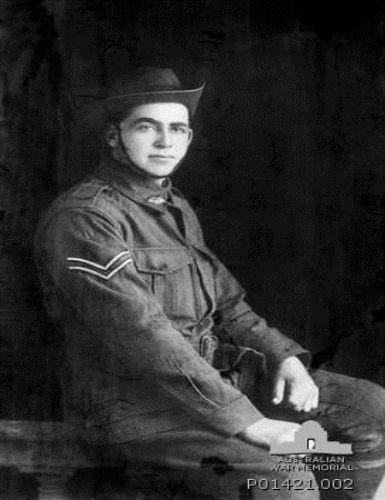
Corp. Alexander Henry Buckley VC. 54th Battalion. (posthumous)
Corp. A.H.Buckley was posthumously awarded the Victoria Cross following his battalion's operation at Peronne
on 1/2 September 1918. The 54th Battalion was to take ground between the town and the river, then
move into Peronne ''if not too strongly opposed''. They moved forward in drizzle and cleared the first
line of German trenches, but were then held up by a nest of machine-guns. Corp. Buckley charged forward shot
four of the posts occupants and took 22 prisoners. He was killed while attempting to cross a footbridge into town.
Corp. Buckley's citation praised his ''great initiative, resource and courage'', as well as his ''self-sacrificing devotion to duty''.
He was buried in the war cemetery at Peronne.
Wayne.

Rob
Four Star General
- Joined
- May 18, 2005
- Messages
- 26,622
John Vaughan Campbell VC;
Campbell was 39 years old, and a temporary lieutenant-colonel commanding the 3rd Battalion, Coldstream Guards, British Army, during the First World War when the following deed took place for which he was awarded the VC.
On 15 September 1916 at Ginchy, France, during the Battle of the Somme, Lieutenant Colonel Campbell took personal command of the third line when the first two waves of his battalion had been decimated by machine-gun and rifle fire. He rallied his men and led them against the enemy machine-guns, capturing the guns and killing the personnel. Later in the day he again rallied the survivors of his battalion and led them through very heavy hostile fire. His personal gallantry and initiative at a very critical moment enabled the division to press on and capture objectives of the highest tactical importance.
Campbell was 39 years old, and a temporary lieutenant-colonel commanding the 3rd Battalion, Coldstream Guards, British Army, during the First World War when the following deed took place for which he was awarded the VC. On 15 September 1916 at Ginchy, France, during the Battle of the Somme, Lieutenant Colonel Campbell took personal command of the third line when the first two waves of his battalion had been decimated by machine-gun and rifle fire. He rallied his men and led them against the enemy machine-guns, capturing the guns and killing the personnel. Later in the day he again rallied the survivors of his battalion and led them through very heavy hostile fire. His personal gallantry and initiative at a very critical moment enabled the division to press on and capture objectives of the highest tactical importance.

Campbell was 39 years old, and a temporary lieutenant-colonel commanding the 3rd Battalion, Coldstream Guards, British Army, during the First World War when the following deed took place for which he was awarded the VC.
On 15 September 1916 at Ginchy, France, during the Battle of the Somme, Lieutenant Colonel Campbell took personal command of the third line when the first two waves of his battalion had been decimated by machine-gun and rifle fire. He rallied his men and led them against the enemy machine-guns, capturing the guns and killing the personnel. Later in the day he again rallied the survivors of his battalion and led them through very heavy hostile fire. His personal gallantry and initiative at a very critical moment enabled the division to press on and capture objectives of the highest tactical importance.
Campbell was 39 years old, and a temporary lieutenant-colonel commanding the 3rd Battalion, Coldstream Guards, British Army, during the First World War when the following deed took place for which he was awarded the VC. On 15 September 1916 at Ginchy, France, during the Battle of the Somme, Lieutenant Colonel Campbell took personal command of the third line when the first two waves of his battalion had been decimated by machine-gun and rifle fire. He rallied his men and led them against the enemy machine-guns, capturing the guns and killing the personnel. Later in the day he again rallied the survivors of his battalion and led them through very heavy hostile fire. His personal gallantry and initiative at a very critical moment enabled the division to press on and capture objectives of the highest tactical importance.

waynepoo
Colonel
- Joined
- Jan 3, 2012
- Messages
- 9,801
Victoria Cross laureate of the first A.I.F.
Sgt. Maurice Vincent Buckley VC,DCM. 13th. Battalion.
Maurice Buckley enlisted in the 13th Light Horse Regiment on 18 December 1914 but
found himself discharged in September the following year '''declared a deserter, 20 March 1916,
and struck off strength.''
On 6 May 1916 he enlisted again, using the name Gerald Sexton-his brother's first name and
his mother's maiden name. He was sent to France in early 1917 where he fought on the
Western Front. Following the award of the Distinguished Conduct Medal he was promoted
to sergeant in August 1918 and involved in the advance on the Hindenburg line.
The award of the VC was originally gazetted under the pseudonym Gerald Sexton, but he
had disclosed his real identity by the time that it was given to him by King George V at a
ceremony at Buckingham Palace on 29 May 1919.
He was awarded the Victoria Cross for his actions on 18 September 1918, at Le Verguier
near St. Quentin. His unit was advancing under cover of a creeping barrage but was held
up by German machine-gun posts. Sgt. Buckley attacked them with his Lewis gun section
and captured 30 German prisoners. When the advance was again held up by machine-gun
fire, Sgt. Buckley, supported by another platoon, put the enemy guns out of
action. Later, he again showed conspicuous initiative in capturing hostile posts and
machine-guns. According to the citation, he was ''to the fore dealing with enemy machine-guns,
rushing enemy posts, and performing great feats of bravery and endurance without
faltering or for a moment taking cover.''
Wayne.
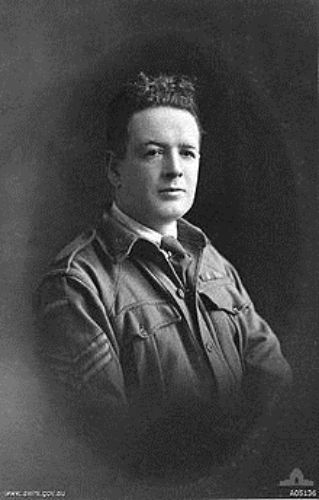
Sgt. Maurice Vincent Buckley VC,DCM. 13th. Battalion.
Maurice Buckley enlisted in the 13th Light Horse Regiment on 18 December 1914 but
found himself discharged in September the following year '''declared a deserter, 20 March 1916,
and struck off strength.''
On 6 May 1916 he enlisted again, using the name Gerald Sexton-his brother's first name and
his mother's maiden name. He was sent to France in early 1917 where he fought on the
Western Front. Following the award of the Distinguished Conduct Medal he was promoted
to sergeant in August 1918 and involved in the advance on the Hindenburg line.
The award of the VC was originally gazetted under the pseudonym Gerald Sexton, but he
had disclosed his real identity by the time that it was given to him by King George V at a
ceremony at Buckingham Palace on 29 May 1919.
He was awarded the Victoria Cross for his actions on 18 September 1918, at Le Verguier
near St. Quentin. His unit was advancing under cover of a creeping barrage but was held
up by German machine-gun posts. Sgt. Buckley attacked them with his Lewis gun section
and captured 30 German prisoners. When the advance was again held up by machine-gun
fire, Sgt. Buckley, supported by another platoon, put the enemy guns out of
action. Later, he again showed conspicuous initiative in capturing hostile posts and
machine-guns. According to the citation, he was ''to the fore dealing with enemy machine-guns,
rushing enemy posts, and performing great feats of bravery and endurance without
faltering or for a moment taking cover.''
Wayne.

waynepoo
Colonel
- Joined
- Jan 3, 2012
- Messages
- 9,801
Victoria Cross laureate of the first A.I.F.
Pte. Henry Dalziel VC. 15th Battalion.
On 4 July 1918 at Hamel Wood while assigned to his battalion transport company,
Pte Dalziel volunteerd to join the attack to make up for a manpower shortage the
battalion was experiencing at that time.
The citation reads:
''For most conspicuous bravery and devotion to duty when in action with a Lewis gun
section. His company met with determined resistance from a strong point which was
strongly garrisoned, manned by numerous machine-guns and, undamaged by our
artillery fire, was also protected by strong wire entanglements. A heavy concentration
of machine-gun fire caused many casualties, and held up our advance. His Lewis gun
having come into action and silenced enemy guns in one direction, an enemy gun
opened fire from another direction. Pte Dalziel dashed at it and with his revolver,
killed or captured the entire crew and gun, and allowed our advance to continue. He
was severely wounded in the hand, but carried on and took part in the capture of the
final objective. He twice went over open ground under heavy enemy artillery and
machine-gun fire to secure ammunition, and though suffering from considerable loss
of blood, he filled magazines and served his gun until severely wounded through the head.
His magnificent bravery and devotion to duty was an inspiring example to all his
comrades and his dash and unselfish courage at a critical time undoubtedly saved
many lives and turned what would have been a serious check into a splendid
success."
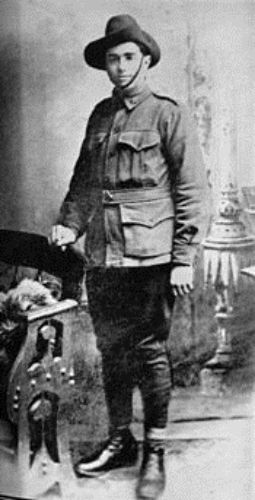
Pte. Henry Dalziel VC. 15th Battalion.
On 4 July 1918 at Hamel Wood while assigned to his battalion transport company,
Pte Dalziel volunteerd to join the attack to make up for a manpower shortage the
battalion was experiencing at that time.
The citation reads:
''For most conspicuous bravery and devotion to duty when in action with a Lewis gun
section. His company met with determined resistance from a strong point which was
strongly garrisoned, manned by numerous machine-guns and, undamaged by our
artillery fire, was also protected by strong wire entanglements. A heavy concentration
of machine-gun fire caused many casualties, and held up our advance. His Lewis gun
having come into action and silenced enemy guns in one direction, an enemy gun
opened fire from another direction. Pte Dalziel dashed at it and with his revolver,
killed or captured the entire crew and gun, and allowed our advance to continue. He
was severely wounded in the hand, but carried on and took part in the capture of the
final objective. He twice went over open ground under heavy enemy artillery and
machine-gun fire to secure ammunition, and though suffering from considerable loss
of blood, he filled magazines and served his gun until severely wounded through the head.
His magnificent bravery and devotion to duty was an inspiring example to all his
comrades and his dash and unselfish courage at a critical time undoubtedly saved
many lives and turned what would have been a serious check into a splendid
success."

This is the Christmas card used by the Royal Munster Fusiliers Regimental Association in 1937. The picture is of the last General Absolution of the Munsters before Rue de Bois. The regiment suffered huge casualties during the battle.
Also present at the battle were a variety of other Irish and British regiments. The Australians played a major role in the battle and also suffered heavy casualties. The Munsters also served in the Anglo-Boer War and beside the Australians in Gallipolli
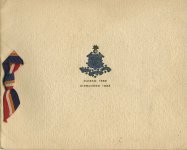
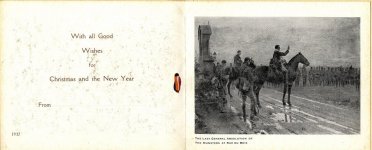
Also present at the battle were a variety of other Irish and British regiments. The Australians played a major role in the battle and also suffered heavy casualties. The Munsters also served in the Anglo-Boer War and beside the Australians in Gallipolli


waynepoo
Colonel
- Joined
- Jan 3, 2012
- Messages
- 9,801
Australian laureate of the Victoria Cross 1914-1918.
Lt. William Thomas Dartnell VC. 25th Battalion, Royal Fusiliers. (posthumous)
Born 6 April 1885 Collingwood, Melbourne. At the age of 27, Dartnell settled in South Africa.
When the Great War started, he volunteered for service and sailed for England. On 12 February,
using the name Wilbur Taylor Dartnell, he joined the 25th (Frontiersmen) Battalion, Royal Fusiliers.
He was promoted to temporary Lt. on 25 July 1915. The Fusiliers reached British East Africa on
May 4 1915 and went at once to their military post on the Uganda railway; their main task was to
protect the railway from enemy raiding parties. In June, Dartnell retrieved the Imperial Ensign from
local headquarters at Bukoba, the German base for attacks on the Uganda frontier. The regiment
was subsequently awarded battle honours for ''Bukoba''.
Shortly after the victory at Bukoba, the battalion moved to Voi in preparation for an allied
advance towards German East Africa. Two companies were dispatched by rail to Makatau,
a small village in the lee of the Taita hills. Thirty-five miles from Voi, it was the railhead of
the military railway then under conctruction towards Taveta. On 3 September 1915, his
mounted infantry patrol was ambushed.
''On 3 September 1915 near Maktau, Kenya, during a mounted infantry
engagement, the enemy were so close that it was impossible to get the
more severely wounded away. Lt. Dartnell, who was himself being
carried away wounded in the leg, seeing the situation, and knowing that the
enemy's native troops murdered the wounded, insisted on being left behind,
in the hope of being able to save the lives of other wounded men. He
gave his own life in a gallant attempt to save others.''
Wayne.
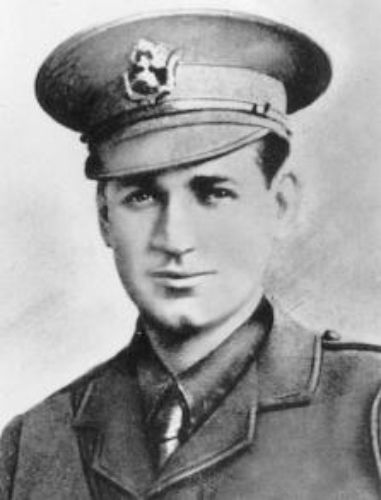
Lt. William Thomas Dartnell VC. 25th Battalion, Royal Fusiliers. (posthumous)
Born 6 April 1885 Collingwood, Melbourne. At the age of 27, Dartnell settled in South Africa.
When the Great War started, he volunteered for service and sailed for England. On 12 February,
using the name Wilbur Taylor Dartnell, he joined the 25th (Frontiersmen) Battalion, Royal Fusiliers.
He was promoted to temporary Lt. on 25 July 1915. The Fusiliers reached British East Africa on
May 4 1915 and went at once to their military post on the Uganda railway; their main task was to
protect the railway from enemy raiding parties. In June, Dartnell retrieved the Imperial Ensign from
local headquarters at Bukoba, the German base for attacks on the Uganda frontier. The regiment
was subsequently awarded battle honours for ''Bukoba''.
Shortly after the victory at Bukoba, the battalion moved to Voi in preparation for an allied
advance towards German East Africa. Two companies were dispatched by rail to Makatau,
a small village in the lee of the Taita hills. Thirty-five miles from Voi, it was the railhead of
the military railway then under conctruction towards Taveta. On 3 September 1915, his
mounted infantry patrol was ambushed.
''On 3 September 1915 near Maktau, Kenya, during a mounted infantry
engagement, the enemy were so close that it was impossible to get the
more severely wounded away. Lt. Dartnell, who was himself being
carried away wounded in the leg, seeing the situation, and knowing that the
enemy's native troops murdered the wounded, insisted on being left behind,
in the hope of being able to save the lives of other wounded men. He
gave his own life in a gallant attempt to save others.''
Wayne.

waynepoo
Colonel
- Joined
- Jan 3, 2012
- Messages
- 9,801
Victoria Cross laureate of the first A.I.F.
Corp. Phillip Davey, VC, MM. 10th Battalion.
He was invalided home from Gallipoli, but returned to his unit in France
in 1916. He was accidentally wounded in March 1917 and gassed in October. In January 1918 he was
awarded the Military Medal, Remarkably, his two brothers received the same award.
At Merris, on 28 June 1918, Corp. Davey's platoon came under heavy fire and the commander was killed.
Survivors sheltered in a ditch under almost point-blank fire from a German machine-gun. Corp. Davey
launched a solo attack on the enemy until forced to return for more grenades. Attacking again, he
killed the crew and captured the gun, then used it to mount a successful counter-attack until he was
wounded. Corp. Davey's wounds were severe and he was sent to Britain to recover before returning to
Australia in 1919.
Wayne.
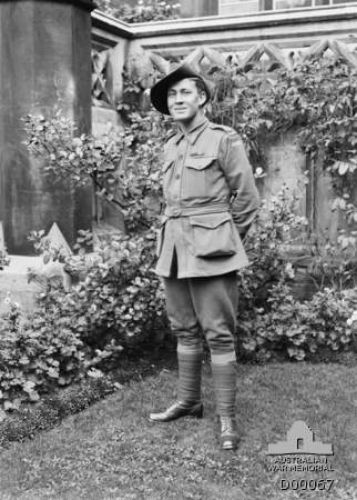
Corp. Phillip Davey, VC, MM. 10th Battalion.
He was invalided home from Gallipoli, but returned to his unit in France
in 1916. He was accidentally wounded in March 1917 and gassed in October. In January 1918 he was
awarded the Military Medal, Remarkably, his two brothers received the same award.
At Merris, on 28 June 1918, Corp. Davey's platoon came under heavy fire and the commander was killed.
Survivors sheltered in a ditch under almost point-blank fire from a German machine-gun. Corp. Davey
launched a solo attack on the enemy until forced to return for more grenades. Attacking again, he
killed the crew and captured the gun, then used it to mount a successful counter-attack until he was
wounded. Corp. Davey's wounds were severe and he was sent to Britain to recover before returning to
Australia in 1919.
Wayne.

waynepoo
Colonel
- Joined
- Jan 3, 2012
- Messages
- 9,801
Victoria Cross laureate of the first A.I.F.
Corp. William Dunstan, VC. 7th Battalion.
Twenty year old Corp. Dunstan was awarded the Victoria Cross for
his actions on 9 August 1915, at Lone Pine, Gallipoli. The enemy
made a determined counter-attack on the centre of the newly captured
trench held by Lt. Tubb and two corporals, Burton and Dunstan and a
few men. The enemy blew in the sand-bag barricade, leaving only a foot
standing, but Lt. Tubb and the two corporals repelled the enemy and rebuilt
the barricade. Twice more the Turks blew in the barricade and on each
occasion they were repelled and the barricade rebuilt.
Corp. Dunstan was blind for a year after Lone Pine. He later achieved the
rank of Lieutenant.
Wayne.
Corp. William Dunstan, VC. 7th Battalion.
Twenty year old Corp. Dunstan was awarded the Victoria Cross for
his actions on 9 August 1915, at Lone Pine, Gallipoli. The enemy
made a determined counter-attack on the centre of the newly captured
trench held by Lt. Tubb and two corporals, Burton and Dunstan and a
few men. The enemy blew in the sand-bag barricade, leaving only a foot
standing, but Lt. Tubb and the two corporals repelled the enemy and rebuilt
the barricade. Twice more the Turks blew in the barricade and on each
occasion they were repelled and the barricade rebuilt.
Corp. Dunstan was blind for a year after Lone Pine. He later achieved the
rank of Lieutenant.
Wayne.

waynepoo
Colonel
- Joined
- Jan 3, 2012
- Messages
- 9,801
Victoria Cross laureate of the first A.I.F.
Sgt. John James Dwyer. 4th Company, Machine Gun Corps.
Sgt. Dwyer was 27 years of age when the following deed took place for which he was later awarded the Victoria Cross.
On 26 September 1917 at Zonnebeke, Belgium, Sgt Dwyer, in charge of a Vickers machine-gun during an advance, rushed
his gun forward to within 30 yards of an enemy machine-gun, fired point blank at it and killed the crew. He then seized the
gun and carried it back across shell-swept ground to the Australian front line. On the following day, when the position was
being heavily shelled, and his Vickers gun was blown up, he took his team through the enemy barrage and fetched a reserve
gun which he put to use in the shortest possible time.
Dwyer later achieved the rank of Lieutenant.
Wayne.
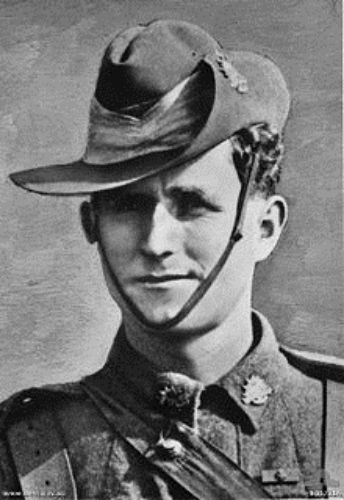
Sgt. John James Dwyer. 4th Company, Machine Gun Corps.
Sgt. Dwyer was 27 years of age when the following deed took place for which he was later awarded the Victoria Cross.
On 26 September 1917 at Zonnebeke, Belgium, Sgt Dwyer, in charge of a Vickers machine-gun during an advance, rushed
his gun forward to within 30 yards of an enemy machine-gun, fired point blank at it and killed the crew. He then seized the
gun and carried it back across shell-swept ground to the Australian front line. On the following day, when the position was
being heavily shelled, and his Vickers gun was blown up, he took his team through the enemy barrage and fetched a reserve
gun which he put to use in the shortest possible time.
Dwyer later achieved the rank of Lieutenant.
Wayne.

Users who are viewing this thread
Total: 2 (members: 0, guests: 2)


